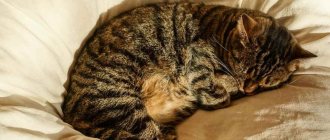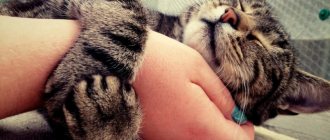Why does a cat eat little and sleep a lot for several days?
In most cases, the reason for a cat's lack of activity is due to trivial reasons.
Why does a cat eat little and sleep a lot for several days, reasons:
- The advanced age of the animal . If the cat is more than 10 years old, you shouldn’t be surprised if it turns from an active, cute kitten into a lethargic pet. Animals, like people, move less in adulthood and develop a large number of chronic ailments.
- Condition after estrus . If you have been breeding a cat, then do not be surprised if 3-4 days after this process it becomes lethargic. Over the course of 3-4 weeks, the animal will be quite lethargic and behave differently than usual. This indicates that the mating was successful, the animal needs rest, as well as good care, in order to raise strong and healthy offspring.
- Increase in ambient temperature . At a temperature of +30, not only people, but also animals do not feel very good and cheerful. The animals have decent fur, with the exception of sphinxes. Therefore, pets feel bad; often in hot weather, animals prefer to hide under the sofa, bed and in places where it is quite cool and sunlight does not penetrate. Pets hide, sleep a lot and are reluctant to come when called.
Kittens
How long do cats sleep?
Cats sleep 2-2.5 times longer than people; on average, it takes them from 14 to 22 hours for this serene activity. Their sleep is not continuous: the animal quickly falls asleep, wakes up, does its business and again plunges into the arms of Morpheus.
Why do cats sleep so much and what determines the duration of their sleep?
To answer this question, you need to turn to the physiology of pets. In the wild, predator cats hunt to get food - they cannot afford to sleep as much as a cat living in the house sleeps.
Pets are deprived of the need to get their own food - they spend all their free time sleeping. In addition, only in a state of deep sleep do cats fully rest.
Several factors influence the length of a cat's sleep:
- Pet's age. Kittens and older cats sleep much longer.
- Cat breed. The Scots and British can go to bed as soon as they eat. The Abyssinian cat and the Ocicat have an active temperament from a young age, so their sleep duration is less.
- Health status and stress are two other factors that affect sleep duration. Sick animals and stressed cats sleep less. Their sleep is more sensitive.
- The situation in the house and the environment in which the cat is located. Restless sleep may be a consequence of the cat being scared, uncomfortable, or someone in the household bothering her greatly.
If your pet is healthy, well-fed, but sleeps less than 12 hours a day and his sleep is intermittent and restless, try to find and eliminate the cause of his discomfort. You may have to build him a secluded sleeping place or simply give him more attention and affection.
How many hours should a kitten sleep?
We have already mentioned that kittens sleep longer than adults. Newborn babies can sleep for almost days, waking up only to eat.
Grown-up kittens at the age of 1 month sleep a little less - 21-22 hours. This is considered normal, because adequate sleep is necessary for the growth and development of the baby. Therefore, it is so important to create a cozy, secluded place for the cat and kittens in order to protect the kittens’ and mother’s sleep from unnecessary intrusive attention. By the way, while the kitten is with its mother and sucks milk, its daily schedule is determined by the mother cat.
Grown-up 2-month-old kittens sleep 18-20 hours a day. This is a time of active growing up. Babies begin to crawl around their mother, explore the world and play with their brothers and sisters. After another couple of months, kittens learn to run and jump - they like these activities, they stay awake for these active games.
Sleep duration of adult cats
It is difficult for the owner to say how much cats sleep per day; some people think that cats sleep constantly. In fact, healthy adults sleep less than kittens.
Their normal sleep duration is 14-16 hours.
Of course, everything is very individual and depends on the pet’s state of mind, the situation in the house, and the temperament characteristics of the breed. But, even if your adult and absolutely healthy cat sleeps for about 20 hours, this is not a reason to contact the veterinarian. The alarm should only be sounded when other symptoms are added to prolonged sleep: poor appetite, decreased activity, lethargy.
How long do older cats sleep?
With age, the duration of a cat's sleep increases significantly.
Very old cats can sleep at the level of kittens - up to 22 hours a day.
Animals wake up only to eat and go to the toilet. During this period of a pet's life, owners should be especially attentive to the health of an aging cat. Natural degenerative processes occur in the animal’s body.
How long do sick cats sleep?
Sick animals may experience changes in sleep time. Moreover, both in the direction of increasing its duration and in the direction of decreasing it.
If the cat sleeps much longer and has other negative symptoms: apathy, poor appetite, fever, diarrhea, the animal must be urgently shown to a veterinarian.
A significant reduction in sleep time may indicate thyroid abnormalities. In any case, only a doctor should make a diagnosis.
The main causes of cat sleep disturbance
Animals, like people, can suffer from sleep disorders: insomnia or drowsiness. The main reasons for such violations:
- heat or cold;
- pregnancy;
- stressful situation: moving, the appearance of a newborn or a new pet in the house;
- high hormonal levels, thyroid dysfunction;
- diseases: fever, worms, diarrhea, etc.
Material from the site https://murkote.com
After vaccination, the cat is lethargic and sleeps, what should I do?
Do not worry if after the administration of the drug the cat feels lethargic and does not show activity.
After vaccination, the cat is lethargic and sleeps, what to do:
- This often happens after vaccinations. After all, substances are usually administered that provoke a mild stage of the disease, thereby forming immunity. There is nothing wrong with reducing your pet's activity.
- Take care of him, let him drink a lot of water and pamper your pet with goodies during this period. After vaccination, cats refuse to eat, so you can lure them with some treats that you rarely give.
- Decreased appetite and lethargy are observed after the administration of anthelmintic drugs. If you give your cat a dewormer, don't be surprised if she becomes lethargic and refuses to eat. Such medications have a large list of side effects and contraindications. Among them are: lethargy, lack of appetite, and decreased activity.
Resting
After sterilization, the cat is lethargic and sleeps: what to do?
If your pet has undergone sterilization or other operations, do not be upset or surprised if your friend constantly sleeps, is lethargic and eats poorly. The cat may refuse to eat for some time after sterilization. Make sure she drinks water.
After sterilization, the cat is lethargic and sleeps:
- If the cat refuses water, pour it from the syringe after removing the needle. Very often, after abdominal surgery, the animal can recover from anesthesia and anesthetics for about one to two days.
- During this period, try to feed him soft food, some soft canned food that is easily digestible. It is necessary to avoid constipation; do not feed your cat solid food or food that is difficult to stomach.
- The ideal option would be canned food or meat pieces in sauce.
Sleeping
The cat is lethargic and sleeps after the dacha, what should I do?
Any trip for a pet is stressful. If you are taking your cat to the dacha or on a visit in a carrier, this may frighten it. This is a lot of stress for the animal, so it may react inappropriately, scratch, or meow.
The cat is lethargic and sleeps after the dacha, what to do:
- After a trip, a cat often hides under the bed for one or two days, and is in no hurry to come out to its owner. Thus, she expresses her dissatisfaction; during this period it is better not to touch her, leaving her alone.
- Don't be upset if your animal suffers from lack of appetite, everything will get better in a couple of days. Try not to bother the cat or take it out of secluded places. Let him enjoy his solitude, because the animal needs time to calm down.
Sleepy pets
How to make a cat sleep
It's likely that your cat will still wake up during the night; felines have shorter sleep cycles. It is important to let your cat know that your sleep should be respected and not disturb your owner's sleep.
Don’t reinforce bad habits in your cat: if you want to eat at night, don’t give your cat anything. The pet will guess and wake you up to beg for a night snack.
You should not feed your cat first thing in the morning - this also reinforces the cat’s desire to wake you up for food. Make it clear that the owner wakes up whenever he wants.
If you can't get your pet to sleep, contact your veterinarian.
The doctor will tell you how to adjust your cat’s daily routine and prescribe medications if necessary. Did you like the article? Share with your friends!
After a fight, the cat is lethargic and sleeps, what should I do?
Outdoor cats often get into fights and can therefore be subject to injury. You should not be surprised if after such a showdown the animal is lethargic, does not show physical activity, refuses food, and wants to rest a lot. This is a completely normal situation for an animal; you need to leave it alone.
After a fight, the cat is lethargic and sleeps, what to do:
- You should be careful if the animal reacts violently to attempts to touch it. If a cat reacts negatively to touching a certain part of the body, then it is in this area that the damage is located.
- Due to the thick fur, small bites and wounds are not visible. Therefore, the pet owner may not be aware of the fight that happened. If you notice that touching a certain area causes excessive activity in the animal, you should try to move the fur away and find the site of the bite. It looks like two small dots, which are located at a distance of 1-2 cm from each other.
- These are nothing more than bite marks from fangs. Cats usually bite with their canines, which are found on the upper and lower jaws. The problem is that these teeth are very thin, which contributes to the appearance of small wounds that are difficult to notice. The surface of the fangs contains a large number of pathogenic microorganisms that easily enter the pet’s blood.
- A few days after the fight, suppuration and severe pain may occur at the bite sites. We recommend that you take the animal to a veterinarian for examination immediately after the fight. If any damage or wounds are noticed, the doctor will provide the necessary assistance. Cats fight often, the most common injuries being paw hits to the head, nose, and ears. It is not uncommon to notice a small amount of blood near the ears or on the nose after a fight. The tail and hindquarters are often injured if the animal runs away. However, if cats come face to face with each other, they may roll around on the floor. In this case, any place on the animal’s body can be damaged.
It is worth sounding the alarm if, a few days after the fight, the cat experiences shortness of breath, the temperature rises or falls. This may indicate serious injuries or abscesses at the bite sites. It is necessary to urgently take the animal to the veterinarian. You should not let the situation get worse, as this could result in the death of your pet.
Lethargic pet
How and where is the most comfortable place for a cat to sleep?
The pet chooses a secluded, quiet and peaceful place to sleep, where no one will disturb him. It is worth purchasing a house with soft walls and a bottom. Here the cat is comfortable and safe. But it has been correctly noted that cats can comfortably sleep almost anywhere. If an animal feels safe, well-fed, and healthy, it will definitely not have any problems finding a place to sleep.
Observing behavior, owners ask questions related to their cats' sleep. For example, why does a cat sleep with its eyes open? If this is noticed, you should not frighten or wake the animal. This natural state for a cat's sleep is indicative of a shallow, pleasant slumber, especially in older pets.
Sleeping with your eyes open, accompanied by symptoms of paralysis, should alert you. It is dangerous if the animal’s eyes become cloudy, convulsions are observed, and the breathing rhythm is disrupted.
A cat loves to sleep on its owner's stomach for a number of reasons. In some cases, she may feel early pregnancy. Some furry owners say that the animal sensed pregnancy before they knew about it themselves.
Sometimes the cat tries to improve the owner’s well-being in this way. It is possible that the furry one intuitively senses health problems. Some owners and even experts are confident that a cat lying on its owner’s stomach can relieve stress and improve his mood. In this case, the animal tries to position itself closer to the solar plexus.
Why does a cat sleep on its head? Many people think that this is a bad sign. In fact, in this way she is trying to express her devotion and love for the person. The cat may feel a headache and makes attempts to relieve it.
Sometimes the cat begins to exhibit strange behavior, which raises some questions for the person, such as why the cat sleeps in the litter box. This can happen for a number of reasons:
- has difficulty using the toilet, has problems with urination;
- does not have a secluded place to sleep;
- it's just a bad habit that needs to be broken.
In the first two cases, you should contact a veterinarian. In other cases, it will be enough to provide your pet with a comfortable place to sleep, taking care of its convenience and comfort.
A cat sleeps on its back for a number of reasons:
- the ambient temperature is too high and the animal is simply too hot;
- love and trust in the person and everyone living in the apartment;
- problems with organs located in the groin area;
In the latter case, it is worth observing the animal, its behavior, and whether the cat is experiencing difficulties with urination. In case of deviations, you should seek veterinary help.
Why has my cat been sleeping a lot lately?
There is no need to worry or sound the alarm if your cat sleeps a lot in a cold room. This is one of the ways to maintain balance, balance, and also warmth. The cat tries to sleep curled up in a ball most of the time.
Why has my cat been sleeping a lot lately?
- This allows you to keep warm and not freeze. The animal does exactly the same thing in extreme heat. After all, when eating a large amount of food and physical activity, the body can heat up.
- If the house is very hot, the animal may refuse to eat, drink only water and sleep a lot. This is one way to maintain thermal balance and not overheat.
- Pets react sharply to changes in the house during renovation work.
- After a visit to the doctor, the animal becomes lethargic and drowsy. Stress is to blame for everything.
- During the move, the animal also does not feel very well; it needs time to adapt to get used to the new housing.
- Little attention from the owners. This may be due to the owner’s new job and difficult life circumstances. The animal does not have enough affection, so it gets upset, protests, refuses food and spends most of its time in a state of sleep.
Rest
The cat is lethargic and sleeps a lot: normal or a sign of illness?
There are pathological causes of sleepiness that are worth paying attention to.
They are often accompanied by the following symptoms:
- Fever, increased temperature
- The pet is trying to hide from view, go to a dark place where no one will find it
- The animal refuses food and water
- The pet does not play with its favorite toys, refuses affection, runs away and hides
- The pet has vomiting, nausea, indigestion
- The presence of hoarse breathing, runny nose, and purulent eyes
- Pale color of tissues in the mouth area
- Uncertain gait, trembling and unsteadiness
- Constant meowing, including in sleep
- Very aggressive reaction to touching certain parts of the body
- Untidy and crumpled fur
If the cat is lethargic, sleeps a lot, along with the above symptoms, this indicates that the animal needs help, and perhaps a serious illness is to blame for its sleepy state and apathy.
Pet
Visual acuity
It is important to understand that cats can easily detect any movements of your body in the dark. They may mistake this for a call to play. It is impossible to fundamentally change this situation. However, try to learn not to toss and turn too much in your sleep. But it is not recommended to completely close the doors to the bedroom, since cats are tied to their territory. This will only anger the animal. Try not to pay attention if your pet enters the room. The period of adaptation to the new rules will take from two weeks to a month.
How you like it: Indian chef showed how to boil eggs (video)
"Children need happy parents." Natalie Nevedrova named the reason for the divorce
Mazda SUVs will be rear-wheel drive by 2022 with Skyactiv-X engine
The street cat is lethargic, sleeps all day: reasons
The behavior of an animal is affected by its living conditions. If this is a street animal, you should not be surprised that during the day it sleeps almost all the time. Cats are nocturnal predators that prefer to hunt in the dark and rest during the day.
The street cat is lethargic, sleeps all day, reasons:
- You should not be surprised if, after hunting at night and eating prey, the animal wants to sleep off during the day. After all, it was quite active almost all night. Outdoor cats often come home in the morning to eat and sleep.
- In the evening the animal will go hunting again. Indoor cats that don't go outside behave a little differently. They adapt to their owner's routine, so they sleep at night and are awake during the day.
- It is considered normal if the animal sleeps for 12-14 hours. However, there are pets that have a calm character and can rest a little more. Kittens sleep much more than their adult relatives. After all, just like human babies, they eat a lot and rest all the time in order to grow. After all, it is in the state of sleep that both people and animals grow. As they grow older, the duration of sleep decreases and the animal becomes more active.
Rest
Why doesn't the cat sleep at night?
Cats are small predators for whom hunting at night is a common thing.
Adult pets living in comfortable conditions and having free access to food may fall asleep early in the morning and sleep all day. When evening comes, the pet wakes up, its activity intensifies, it begins to play and demand attention. This case is natural; if desired, the lifestyle of your four-legged friend can be adjusted.
Main reasons
But sometimes the reasons why a cat does not sleep are associated with the negative influence of external and internal factors, among which the following are considered common:
If your pet does not allow you to sleep, then there are reasons for this, for example, he is hungry or he receives little attention during the day.
- Stress. Often a small kitten does not sleep at night due to the stress caused by parting with its mother and moving to a new home. You just need to wait out this period, surround the baby with care and affection so that he quickly gets used to the new environment.
- Demand for attention. If the owner leaves home for the whole day and the cat is left all alone, he may even become depressed. As soon as a person comes home, the pet immediately asks for attention. The animal does not fall asleep until the owner plays with it and cries if the owner ignores communication.
- Hunger. A pet that doesn't eat regularly or doesn't get enough food may wake up in the middle of the night if it's hungry. If a cat meows or scratches at the door, demanding food, you should not ignore his requests. In addition, it is important to establish a diet so that hunger does not take you by surprise at the wrong time.
- Hormonal surges. A cat's heat is always accompanied by serious changes in the animal's behavior. In a fit of passion, the cat tirelessly rushes around the house, scratches doors, rages, and has trouble sleeping at night.
- Progression of internal diseases. Often, various diseases have a negative impact on the overall well-being of a cat. The animal is experiencing pain, discomfort and other problems. The pet cannot get enough sleep, so even in the morning his mood is bad, he constantly lies down to somehow alleviate the condition.
The cat is lethargic and constantly sleeps: trivial reasons unrelated to the disease
If you notice a fever, nasal discharge, or worsening hair condition, you should consult a doctor. The animal may react sensitively to changes in food. Therefore, if you switch your pet to a different food, do not be surprised if he refuses food for some time and also becomes lethargic. The animal feels unwell after traveling by car. This is associated with motion sickness and shaking. A condition similar to motion sickness in children.
The cat is lethargic and constantly sleeps, trivial reasons unrelated to the disease:
- The animal may be stressed due to the arrival of a new family member . This could be another animal or person, the mistress’s lover.
- Change of owner. The animal needs time to get used to its new owners and find a common language. The animal will hide for some period of time and not make contact.
- After the guests' visit . If your acquaintances or friends with small children come to the house, the animal may refuse food and hide under the bed. This is quite normal, since pets do not really like children and constantly hide from them.
- After bathing and hygiene procedures . For some animals, such manipulations are stressful, so a day or two after bathing the cat does not feel very well and constantly hides from its owner.
- First time on the street. If you take your pet for a walk for the first time, you shouldn’t be surprised if he doesn’t behave quite adequately. For an animal this is stress, anxiety, it does not know how to react to the world around it. The first few walks the animal may behave aggressively or, conversely, seem too fearful. After such walks, the animal sleeps most of the time.
Ryzhik
A lot of interesting information for breeders can be found in the articles on our website:
- Is it possible to give cats human tablets, No-shpu, Valerian tablets? How to give a bitter pill to a cat without spitting it out?
- What can you feed a 1-6 month old kitten without a cat and how many times a day: list of feeds, products and dishes, feeding regimen
- Is it possible to leave a cat alone for a day, 5 days, a week, two weeks? How long can you keep a cat or kitten: reviews, veterinarians’ opinions
- Why does a cat itch and lick itself, but there are no fleas? The cat is constantly itching: causes, methods of treatment
The condition of an animal can be determined by its appearance. Therefore, if your pet is lethargic and refuses to eat, you need to pay attention to its condition. Look and evaluate the condition of the coat. If it is shiny, smooth, the mucous membrane is pink, the nose is moist, the pulse and temperature are normal, there is no discharge from the eyes, ears, or nose, then the cat’s condition is normal. There is no need to worry in such a situation.
Basic mistakes
There are a number of mistakes that owners make when their cat interferes with their sleep at night. What you should not do in relation to your pet:
- Don't lock your pet in a separate room. In a confined space, your furry friend will experience even more stress, which can lead to excessive aggressiveness.
- Do not throw objects at the animal, do not take out your anger on it. Cats are animals with a good memory, they will not forget such a prank. They may begin to retaliate by scratching things or releasing their claws when playing with you.
- Allow the cat to walk on its own for a long time. Walking for your pet would be a good idea, but also in moderation under supervision.
- Get rid of your pet. It happens that people euthanize an animal or send it to a shelter because of such behavior. This cannot be done, because when accepting a new family member, you should have taken into account that difficulties may arise during upbringing.
Don’t worry too much or be nervous about your pet’s nightly games. Almost everyone has such parenting difficulties, but after overcoming them, your cat will become affectionate and quiet. Then you can enjoy quiet nights without unnecessary noise. Always try to understand your pets, then you will not have difficulties with them!











